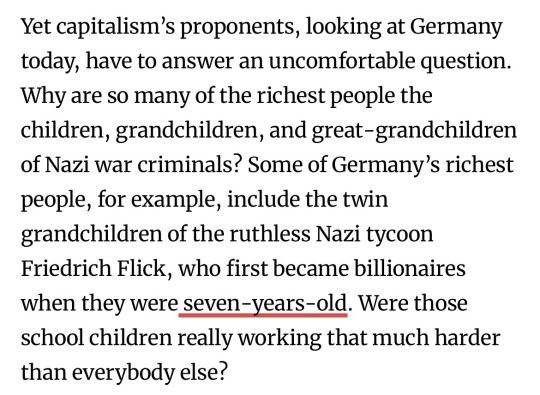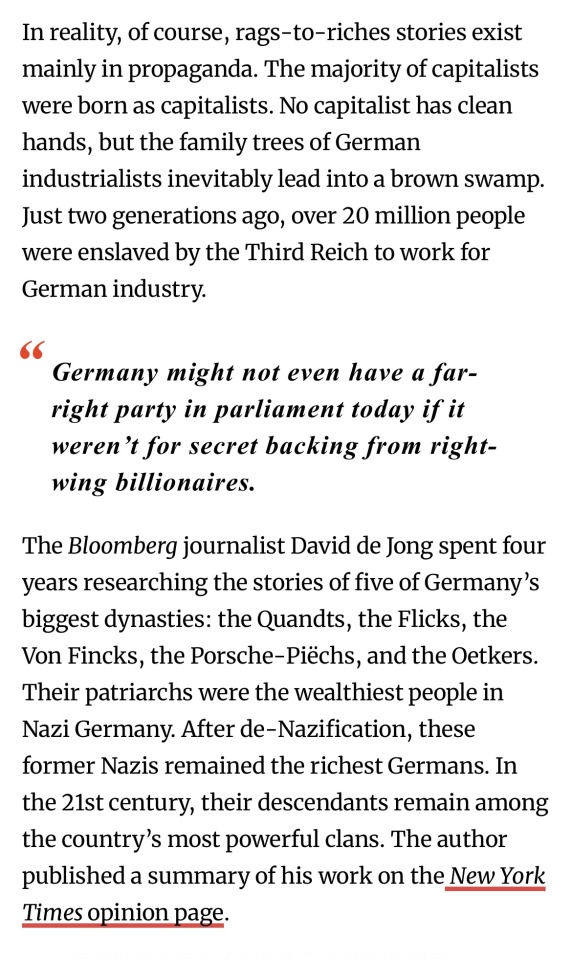#denazification
Text

Hours after Russian President Vladimir Putin offered “denazification” as a flimsy pretext for his invasion of Ukraine, Russian missiles hit the Jewish hub of Uman, Ukraine, killing at least one civilian. Ukraine has begun evacuating its cities of civilians, including Uman.
This article is from February 2022, but the pictures below are from April 2023, as Putin continues bombing Uman, an historic city with a mostly Jewish population.
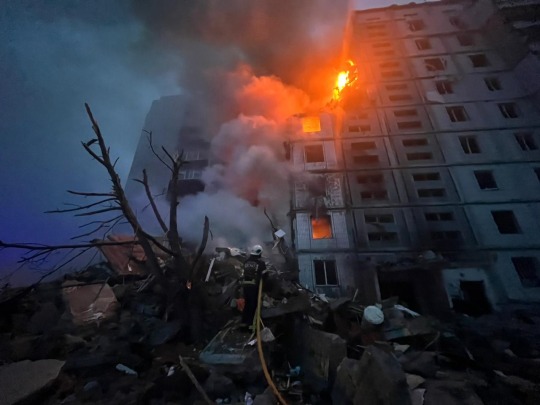

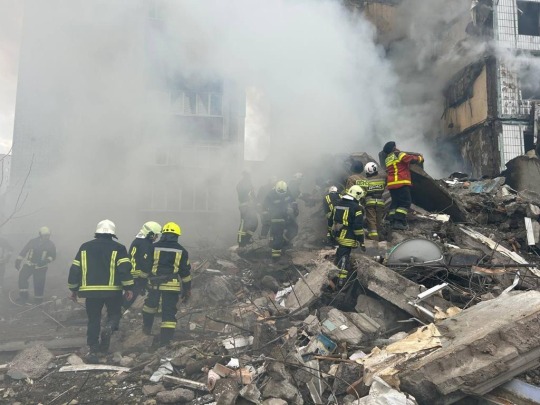

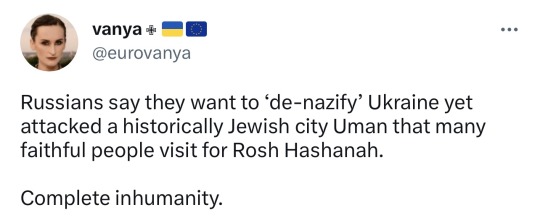




Ah yes, Russia is bombing and attacking heavily Jewish, civilian population centers like Dnipro, Uman and Odesa to “denazify” Ukraine. Because of course they are.
Makes total sense, IF you’re a braindead tankie who eats up Russian propaganda.
“If you still believe Vladimir Putin’s propaganda that he’s trying to de-Nazify Ukraine, you should talk to Ukrainian Jews. They don’t buy a word of it.”
#politics#ukraine#russia#uman#tankies#antisemitism#odesa#dnipro#🇺🇦#putin apologists#little putler#adolph putin#denazification#russian propaganda
458 notes
·
View notes
Text
Denazification, truth and reconciliation, and the story of Germany's story

Germany is the “world champion in remembrance,” celebrated for its post-Holocaust policies of ensuring that every German never forgot what had been done in their names, and in holding themselves and future generations accountable for the Nazis’ crimes.
All my life, the Germans have been a counterexample to other nations, where the order of the day was to officially forget the sins that stained the land. “Least said, soonest mended,” was the Canadian and American approach to the genocide of First Nations people and the theft of their land. It was, famously, how America, especially the American south, dealt with the legacy of slavery and Jim Crow.
Silence begets forgetting, which begets revisionism. The founding crimes of our nations receded into the mists of time and acquired a gauzy, romantic veneer. Plantations — slave labor camps where work was obtained through torture, maiming and murder — were recast as the tragiromantic settings of Gone With the Wind. The deliberate extinction of indigenous peoples was revised as the “taming of the New World.” The American Civil War was retold as “The Lost Cause,” fought over states’ rights, not over the right of the ultra-wealthy to terrorize kidnapped Africans and their descendants into working to death.
This wasn’t how they did it in Germany. Nazi symbols and historical revisionism were banned (even the Berlin production of “The Producers” had to be performed without swastikas). The criminals were tried and executed. Every student learned what had been done. Cash reparations were paid — to Jews, and to the people whom the Nazis had conquered and brutalized. Having given in to ghastly barbarism on an terrifyingly industrial scale, the Germans had remade themselves with characteristic efficiency, rooting out the fascist rot and ensuring that it never took hold again.
But Germany’s storied reformation was always oversold. As neo-Nazi movements sprang up and organized political parties — like the far-right Alternative für Deutschland — fielded fascist candidates, they also took to the streets in violent mobs. Worse, top German security officials turned out to be allied with AfD:
https://www.wsws.org/en/articles/2018/08/04/germ-a04.html
Neofascists in Germany had fat bankrolls, thanks to generous, secret donations from some of the country’s wealthiest billionaires:
https://www.spiegel.de/international/germany/billionaire-backing-may-have-helped-launch-afd-a-1241029.html
And they broadened their reach by marrying their existing conspiratorial beliefs with Qanon, which made their numbers surge:
https://www.thedailybeast.com/how-fringe-groups-are-using-qanon-to-amplify-their-wild-messages
Today, the far right is surging around Europe, with the rot spreading from Hungary and Poland to Italy and France. In an interview with Jacobin’s David Broder, Tommaso Speccher a researcher based in Berlin, explores the failure of Germany’s storied memory:
https://jacobin.com/2023/07/germany-nazism-holocaust-federal-republic-memory-culture/
Speccher is at pains to remind us that Germany’s truth and reconciliation proceeded in fits and starts, and involved compromises that were seldom discussed, even though they left some of the Reich’s most vicious criminals untouched by any accountability for their crimes, and denied some victims any justice — or even an apology.
You may know that many queer people who were sent to Nazi concentration camps were immediately re-imprisoned after the camps were liberated. Both Nazi Germany and post-Nazi Germany made homosexuality a crime:
https://time.com/5953047/lgbtq-holocaust-stories/
But while there’s been some recent historical grappling with this jaw-dropping injustice, there’s been far less attention given to the plight of the communists, labor organizers, social democrats and other leftists whom the Nazis imprisoned and murdered. These political prisoners (and their survivors) struggled mightily to get the reparations they were due.
Not only was the process punitively complex, but it was administered by bureaucrats who had served in the Reich — the people who had sent them to the camps were in charge of deciding whether they were due compensation.
This is part of a wider pattern. The business-leaders who abetted the Reich through their firms — Siemens, BMW, Hugo Boss, IG Farben, Volkswagon — were largely spared any punishment for their role in the the Holocaust. Many got to keep the riches they acquired through their part on an act of genocide.
Meanwhile, historians grappling with the war through the “Historikerstreit” drew invidious comparisons between communism and fascism, equating the two ideologies and tacitly excusing the torture and killing of political prisoners (this tale is still told today — in America! My kid’s AP history course made this exact point last year).
The refusal to consider that extreme wealth, inequality, and the lust for profits — not blood — provided the Nazis with the budget, materiel and backing they needed to seize control in Germany is of a piece with the decision not to hold Germany’s Nazi-enabling plutocrats to account.
The impunity for business leaders who collaborated with the Nazis on exploiting slave labor is hard to believe. Take IG Farben, a company still doing a merry business today. Farben ran a rubber factory on Auschwitz slave labor, but its executives were frustrated by the delays occasioned by the daily 4.5m forced march from the death-camp to its factory:
https://pluralistic.net/2023/06/02/plunderers/#farben
So Farben built Monowitz, its own, private-sector concentration camp. IG Farben purchased 25,000 slaves from the Reich, among them as many children as possible (the Reich charged less for child slaves).
Even by the standards of Nazi death camps, Monowitz was a charnel house. Monowitz’s inmates were worked to death in just three months. The conditions were so brutal that the SS guards sent official complaints to Berlin. Among their complaints: Farben refused to fund extra hospital beds for the slaves who were beaten so badly they required immediate medical attention.
Farben broke the historical orthodoxy about slavery: until Monowitz, historians widely believed that enslavers would — at the very least — seek to maintain the health of their slaves, simply as a matter of economic efficiency. But the Reich’s rock-bottom rates for fresh slaves liberated Farben from the need to preserve their slaves’ ability to work. Instead, the slaves of Monowitz became disposable, and the bloodless logic of profit maximization dictated that more work could be attained at lower prices by working them to death over twelve short weeks.
Few of us know about Monowitz today, but in the last years of the war, it shocked the world. Joseph Borkin — a US antitrust lawyer who was sent to Germany after the war as part of the legal team overseeing the denazification program — wrote a seminal history of IG Farben, “The Crime and Punishment of I.G. Farben”:
https://www.scribd.com/document/517797736/The-Crime-and-Punishment-of-I-G-Farben
Borkin’s book was a bestseller, which enraged America’s business lobby. The book made the connection between Farben’s commercial strategies and the rise of the Reich (Farben helped manipulate global commodity prices in the runup to the war, which let the Reich fund its war preparations). He argued that big business constituted a danger to democracy and human rights, because its leaders would always sideline both in service to profits.
US companies like Standard Oil and Dow Chemicals poured resources into discrediting the book and smearing Borkin, forcing him into retirement and obscurity in 1945, the same year his publisher withdrew his book from stores.
When we speak of Germany’s denazification effort, it’s as a German program, but of course that’s not right. Denazification was initiated, designed and overseen by the war’s winners — in West Germany, that was the USA.
Those US prosecutors and bureaucrats wanted justice, but not too much of it. For them, denazification had to be balanced against anticommunism, and the imperatives of American business. Nazi war criminals must go on trial — but not if they were rocket scientists, especially not if the USSR might make use of them:
https://en.wikipedia.org/wiki/Wernher_von_Braun
Recall that in the USA, the bizarre epithet “premature antifascist” was used to condemn Americans who opposed Nazism (and fascism elsewhere in Europe) too soon, because these antifascists opposed the authoritarian politics of big business in America, too:
https://www.thenation.com/article/archive/premature-antifascist-and-proudly-so/
When 24 Farben executives were tried at Nuremberg for the slaughter at Monowitz, then argued that they had no choice but to pursue slave labor — it was their duty to their shareholders. The judges agreed: 19 of those executives walked.
Anticommunism hamstrung denazification. There was no question that German elites and its largest businesses were complicit in Nazi crimes — not mere suppliers, but active collaborators. Antifacism wasn’t formally integrated into the denazification framework until the 1980s with “constitutional patriotism,” which took until the 1990s to take firm root.
The requirement for a denazification program that didn’t condemn capitalism meant that there would always be holes in Germany’s truth and reconciliation process. The newly formed Federal Republic set aside Article 10 of the Nuremberg Charter, which would hold all members of the Nazi Party and SS responsible for their crimes. But Article 10 didn’t survive contact with the Federal Republic: immediately upon taking office, Konrad Adenauer suspended Article 10, sparing 10 million war criminals.
While those spared included many rank-and-file order-followers, it also included many of the Reich’s most notorious criminals. The Nazi judge who sent Erika von Brockdorff to her death for her leftist politics was given a judge’s pension after the war, and lived out his days in a luxurious mansion.
Not every Nazi was pensioned off — many continued to serve in the post-war West German government. Even as Willy Brandt was demonstrating historic remorse for Germany’s crimes, his foreign ministry was riddled with ex-Nazi bureaucrats who’d served in Hitler’s foreign ministry. We still remember Brandt’s brilliant 1973 UN speech on the Holocaust:
https://www.willy-brandt-biography.com/historical-sources/videos/speech-uno-new-york-1973/
But recollections of Brandt’s speech are seldom accompanied by historian Götz Aly’s observation that Brandt couldn’t have given that speech in Germany without serious blowback from the country’s still numerous and emboldened antisemites (Brandt donated his Nobel prize money to restore Venice’s Scuola Grande Tedesca synagogue, but ensured that this was kept secret until after his death).
All this to say that Germany’s reputation as “world champions of memory” is based on acts undertaken decades after the war. Some of Germany’s best-known Holocaust memorials are very recent, like the Wannsee Conference House (1992), the Memorial to the Murdered Jews of Europe (2005), and the Topography of Terror Museum in (2010).
Germany’s remembering includes an explicit act of forgetting — forgetting the role Germany’s business leaders and elites played in Hitler’s rise to power and the Nazi crimes that followed. For Speccher, the rise of neofacist movements in Germany can’t be separated from this selective memory, weighed down by anticommunist fervor.
And in East Germany, there was a different kind of incomplete rememberance. While the DDR’s historians and teachings emphasized the role of business in the rise of fascism, they excluded all the elements of Nazism rooted in bigotry: antisemitism, homophobia, sectarianism, and racism. For East German historians, Nazism wasn’t about these, it was solely “the ultimate end point of the history of capitalism.”
Neither is sufficient to prevent authoritarianism and repression, obviously. But the DDR is dust, and the anticommunism-tainted version of denazification is triumphant. Today, Europe’s wealthiest families and largest businesses are funneling vast sums into far-right “populist” parties that trade in antisemitic “Great Replacement” tropes and Holocaust denial:
https://corporateeurope.org/sites/default/files/2019-05/Europe%E2%80%99s%20two-faced%20authoritarian%20right%20FINAL_1.pdf
And Germany’s coddled aristocratic families and their wealthy benefactors — whose Nazi ties were quietly forgiven after the war — conspire to overthrow the government and install a far-right autocracy:
https://www.reuters.com/world/europe/25-suspected-members-german-far-right-group-arrested-raids-prosecutors-office-2022-12-07/
In recent years, I’ve spent a lot of time thinking about denazification. For all the flaws in Germany’s remembrance, it stands apart as one of the brightest lights in national reckonings with unforgivable crimes. Compare this with, say, Spain, where the remains of fascist dictator Francisco Franco were housed in a hero’s monument, amidst his victims’ bones, until 2019:
https://en.wikipedia.org/wiki/Pedro_S%C3%A1nchez#Domestic_policy
What do you do with the losers of a just war? “Least said soonest mended” was never a plausible answer, and has been a historical failure — as the fields of fluttering Confederate flags across the American south can attest (to say nothing of the failure of American de-ba’athification in Iraq):
https://en.wikipedia.org/wiki/De-Ba%27athification
But on the other hand, people who lose the war aren’t going to dig a hole, climb in and pull the dirt down on top of themselves. Just because I think Germany’s denazification was hobbled by the decision to lets its architects and perpetrators walk free, I don’t know that I would have supported prison for all ten million people captured by Article 10.
And it’s not clear that an explicit antifascism from the start would have patched the holes in German denazification. As Speccher points out, Italy’s postwar constitution was explicitly antifascist, the nation “steeped in institutional anti-fascism.” Postwar Italian governments included prominent resistance fighters who’d fought Mussolini and his brownshirts.
But in the 1990s, “the end of the First Republic” saw constitutional reforms that removed antifascism — reforms that preceded the rise of the corrupt authoritarian Silvio Berlusconi — and there’s a line from him to the neofascists in today’s ruling Italian coalition.
Is there any hope for creating a durable, democratic, anti-authoritarian state out of a world run by the descendants of plunderers and killers? Can any revolution — political, military or technological — hope to reckon with (let alone make peace with!) the people who have brought us to this terrifying juncture?
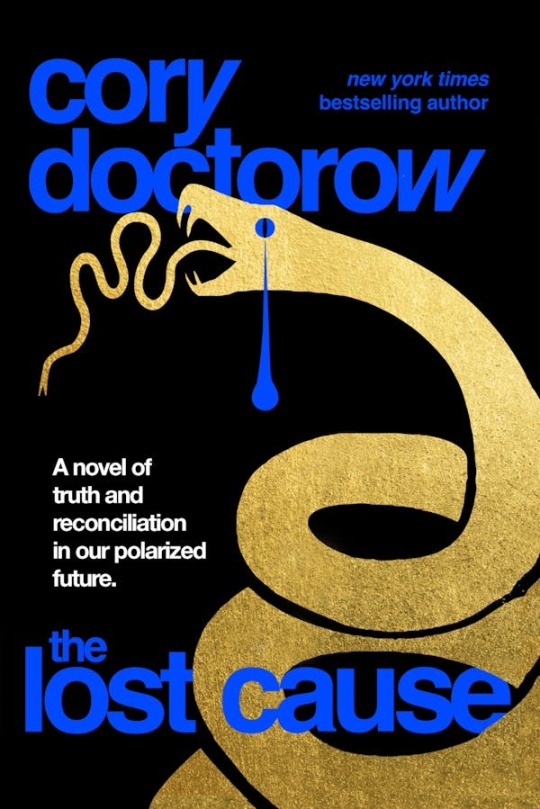
[Image ID: The Tor Books cover for ‘The Lost Cause,’ designed by Will Staehle, featuring the head of the snake on the Gadsen ‘Don’t Tread on Me’ flag, shedding a tear.]
Like I say, this is something I’ve spent a lot of time thinking about — not just how we might get out of this current mess, but how we’ll stay out of it. As is my wont, I’ve worked out my anxieties on the page. My next novel, The Lost Cause, comes out from Tor Books and Head of Zeus in November:
https://us.macmillan.com/books/9781250865939/the-lost-cause
Lost Cause is a post-GND utopian novel about a near-future world where the climate emergency is finally being treated with the seriousness and urgency it warrants. It’s a world wracked by fire, flood, scorching heat, mass extinctions and rolling refugee crises — but it’s also a world where we’re doing something about all this. It’s not an optimistic book, but it is a hopeful one. As Kim Stanley Robison says:
This book looks like our future and feels like our present — it’s an unforgettable vision of what could be. Even a partly good future will require wicked political battles and steadfast solidarity among those fighting for a better world, and here I lived it along with Brooks, Ana Lucía, Phuong, and their comrades in the struggle. Along with the rush of adrenaline I felt a solid surge of hope. May it go like this.
The Lost Cause is a hopeful book, but it’s also a worried one. The book is set during a counter-reformation, where an unholy alliance of seagoing anarcho-capitalist wreckers and white nationalist militias are trying to seize power, snatching defeat from the jaws of the fragile climate victory. It’s a book about the need for truth and reconciliation — and its limits.
As Bill McKibben says:
The first great YIMBY novel, this chronicle of mutual aid is politically perceptive, scientifically sound, and extraordinarily hopeful even amidst the smoke. Forget the Silicon Valley bros — these are the California techsters we need rebuilding our world, one solar panel and prefab insulated wall at a time.
We’re currently in the midst of a decidedly unjust war — the war to continue roasting the planet, a war waged in the name of continuing enrichment of the world’s already-obscenely-rich oligarchs. That war requires increasingly authoritarian measures, increasing violence and repression.
I believe we can win this war and secure a habitable planet for all of us — hell, I believe we can build a world of comfort and abundance out of its ashes, far better than this one:
https://tinyletter.com/metafoundry/letters/metafoundry-75-resilience-abundance-decentralization
But even if that world comes to being, there will be millions of people who hate it, a counter-revolution in waiting. These are our friends, our relatives, our neighbors. Figuring out how to make peace with them — and how to hold their most culpable, most powerful leaders to account — is a project that’s as important, and gigantic, and uncertain, as a just transition is.

Next weekend, I’ll be at San Diego Comic-Con:
Thu, Jul 20 16h: Signing, Tor Books booth #2802 (free advance copies of The Lost Cause— Nov 2023 — to the first 50 people!)
Fri, Jul 21 1030h: Wish They All Could be CA MCs, room 24ABC (panel)
Fri, Jul 21 12h: Signing, AA09
Sat, Jul 22 15h: The Worlds We Return To, room 23ABC (panel)

If you'd like an essay-formatted version of this thread to read or share, here's a link to it on pluralistic.net, my surveillance-free, ad-free, tracker-free blog:
https://pluralistic.net/2023/07/19/stolpersteine/#truth-and-reconciliation

[Image ID: Three 'stumbling stones' ('stolpersteine') set into the sidewalk in the Mitte, in Berlin; they memorialize Jews who lived nearby until they were deported to Auschwitz and murdered.]
#pluralistic#stolpersteine#historians' dispute#Historikerstreit#nazis#godwin's law#mussolini#berlusconi#italy#antifa#fascism#history#truth and reconciliation#the lost cause#denazification
246 notes
·
View notes
Quote
The denazification of Germany is a myth. It never took place. There was a continuation of money and power from Nazi Germany to West Germany, and also, to an extent, in East Germany, because former SS officers became high-ranking Stasi and party officials. But it was far more pervasive in West Germany, where — in whatever part of society, whether business, legal, medical, academic, or media — there was no denazification.
How Nazi Billionaires Thrived in Postwar Germany
132 notes
·
View notes
Text
https://x.com/TuckerCarlson/status/1755734526678925682?s=20
DID YOU LISTEN TO THIS? PLEASE DO, IF YOU HAVEN’T YET🙏🏻
🇷🇺🇺🇦
#russia#ukraine#nazis#dirty politics#crimes against humanity#depopulation agenda#destruction#organised wars#organised crimes#corruption#denazification#truth#please share#wwg1wga
6 notes
·
View notes
Text
Nazi vs Communist statues in Ukraine

2 notes
·
View notes
Text
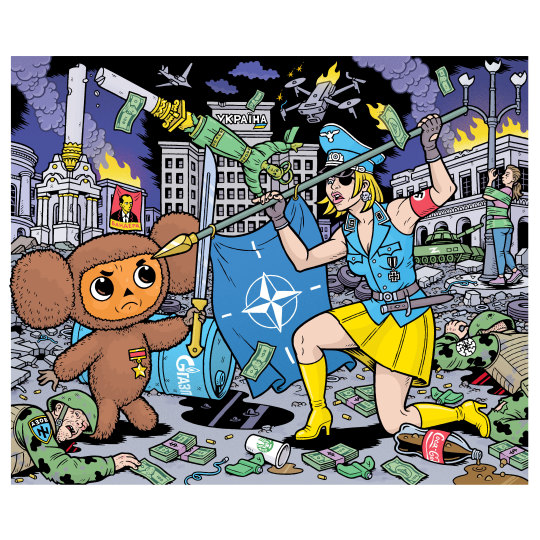
"Cosplay Apocalypse 4: Ukraine”
Illustration by Danny Hellman
10/30/22
#art#illustration#illustrator#comics#cartoonist#cosplay#war#Russia#Ukraine#Kyiv#Maidan#Nazi#Bandera#DeNazification#ProxyWar
2 notes
·
View notes
Text

2 years of denazification, 2 years of struggle and victory, 2 years on the right side of history!
Glory to the brave! Zov!
2 notes
·
View notes
Text

Gaza is a dangerous place for children, any place controlled by a terror organisation like Hamas=ISIS will be.
And UNRWA, UN and UNICEF are jointly responsible. NEVER FORGET!
“The UN has been secretly working with Hamas for years.
UNRWA operations in Gaza are a mask for Hamas
They all KNOW that if Hamas loses control - the whole world will learn many dirty secrets.
It is why - along with several NGOs - they are all so desperate for a ceasefire.”
@mishtal
#unrwafunding#unrwa#unrwa is part of the problem#antisemites#hamas is isis#reeducation#denazification
4 notes
·
View notes
Photo

Shitlibs be like ... “but ... but ...”
#nazis in ukraine#ukraine#stand with peace#anti zelensky#zelensky#Azov Battalion#fuck azov nazis#fuck bandera#us imperialism#no to nato#give peace a chance#denazification
9 notes
·
View notes
Text
{D-Q Note}: Nato Tactics in Ukraine#6
Offensive Weapons, Counter-Offensives and the Issue of Escalation
5 May 2022
1.
Having launched a fresh offensive in Ukraine’s Eastern Front since late April, Russian forces appear to gained further ground moving beyond what was ‘seized’ since 2014. US intelligence forces report that the Russian goal is to annex as much of eastern Ukraine as possible.
Moscow also seeks, it seems, to keep Kyiv and NATO off-balance by false flag operations in Transnistria, Moldova - diverting attention and resources as well as articulating a maximalist, southern Ukraine war aim extending through Odesa and Moldova thus removing Ukraine’s access to a port.
2.
Kyiv’s ability to respond and even push-back, right now, is in transition. Once the Ukrainian forces receive, and can effectively use, the accelerating volume of NATO-provided, longer-range weaponry from artillery, drones, tanks and the like, counter-offensives will occur in earnest, Their likely success in reversing Russian gains since February is an open question especially in places like Kherson where Russian administrations are now bedding-down including incorporation of the region into the ruble-currency zone.
Mick Ryan, an Australian strategist and former general has analysed the issue of prospective Ukrainian counter-offensives.
Source: https://www.abc.net.au/news/2022-05-03/war-ukraine-russia-donbas-nuclear-china-diplomacy-west-strategy/101030510
3.
The question of escalation has been present from the start of Russia’s invasion especially in relation to nuclear weapons use and proliferation. But now the transformation of Ukraine’s conventional force structure raises issues of limiting escalation. For example, it appears Kyiv’s forces have launched attacks into southern Russia to disrupt supply lines and in a spirit of ‘karma’ (and/or revenge) as one official put it. Despite their undoubted value in diverting Russian forces and resources - how far should these go?
US figures have spoken of weakening Russian capacities to intervene for the longer-term: Is this a valid war aim, and if so, how far should it also go? Any weakened, partly or fully defeated Russia is a dangerous state - as Mick Ryan notes. This is only highlighted by Moscow’s astonishing verbal gymnastics to defend the goal of de-nazification in Ukraine including a kind of pre-1945 racial profiling of Jewry as self-hating anti-semites. Longstanding elite ‘views’ or stereotypes in Russia (recently articulated by Dimitri Medvedev, no less), maintain, according to Jason Stanley, that:
Russian Christians are targets of a conspiracy by a global elite, who, using the vocabulary of liberal democracy and human rights, attack the Christian faith and the Russian nation.
Source: https://www.theguardian.com/world/2022/feb/25/vladimir-putin-ukraine-attack-antisemitism-denazify
A defeated Russia, then, remains dangerous.
4.
Until all these transitions in the war are completed - including the implementation of recent war aims the time, dare l say, is not yet ripe, for serious peace negotiations. Once events have played out on the Eastern Front, bargaining positions at the negotiating table will be clearer.
#Ukraine#Russia#crisis#military-strategic policy#foreign policy#weapons#counter-offensive#US#politics#the guardian#the australian broadcasting corporation#denazification#mick ryan
4 notes
·
View notes
Text




war criminals 🇷🇺🤝🇮🇱

The Joseph Goebbels, “always accuse the other side of that which you are guilty of doing” strategy has always worked remarkably well on a lot of people, especially tankies and their counterparts, authoritarian conservatives.
Who will deradicalize Israel, and denazify Russia??
#politics#palestine#israel#russia#ukraine#gaza#benjamin netanyahu#vladimir putin#deradicalization#denazification#war criminals#war crimes#genocide#putin apologists#israel is a terrorist state#russia is a terrorist state#tankies#israeli propaganda#russian propaganda
115 notes
·
View notes
Text
'Oh I'm sorry, you're still upset that these people persecuted you, killed your family, treated you like a retarded farm animal, nearly beat you to death several times, set your property on fire, deported you and tried to starve you to death?
Well, that sounds like a you-problem.
Anyway, we're gonna let these people back to running our state and government now. You get over your trauma, since you know it's in the laws now so you can't be upset anymore because law states you are not allowed to.'
-German politics after WII, basically
#Ich habe eine doku angefangen über Nazirichter die später am Bundesarbeitsgericht gearbeitet haben#And die heute noch mit Bild und Plakette bei denen in der Ahnenhalle hängen#Safe to say that I am mildly upset#As always#Deutschland warum#germany#wwii era#jurisdiction#Generalamnestie#Persilschein#denazification#Yeah that was never intended to age well#nationalsozialismus
2 notes
·
View notes
Link
Your friendly deNazifier
#Canada#Russia#ambassador#Ukraine#Special Military Operation#deNazification#demilitarization#religious freedom#cultural freedom#peaceful coexistence
0 notes
Text
finally a succesful denazification operation

0 notes
Text
A UkroNazi story…

Then this happened…
.
.
.
.
:
:
:
There’s also these tidbits in the script archives:
.
https://ottawacitizen.com/news/national/defence-watch/canada-failed-when-it-trained-ukrainian-troops-linked-to-the-far-right-says-nazi-hunter
.

4 notes
·
View notes
